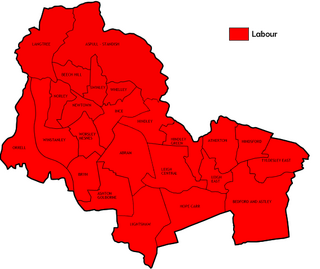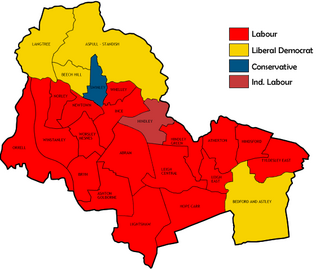
Elections to Wigan Council were held on 7 May 1998. One third of the council was up for election. Following the previous election there had been three by-elections held—in Aspull-Standish, Ince and Hope Carr—with all three successfully defended by Labour.

Elections to Wigan Council were held on 6 May 1999. One-third of the council was up for election. Prior to the election, the Liberal Democrats had gained the seat being fought in Beech Hill from Labour in a by-election, and long-time Labour councillor for Atherton, Jack Sumner, had defected to independent.

Elections to Wigan Council were held on 4 May 2000. One-third of the council was up for election, as well as an extra vacancy in Norley - both of which were uncontested. Since the election, there had been a by-election in which the Liberal Democrats gained the seat being fought in Hindsford from Labour.

Elections to Wigan Council were held on 1 May 2003 with one-third of the council was up for election. Prior to the election, there had been two vacancies in Leigh Central, with Labour winning a by-election in June and the seat being fought in this election filled unopposed by Barbara Jarvis.
The 2010 Winchester Council election took place on 6 May 2010 to elect members of Winchester District Council in Hampshire, England. One third of the council was up for election and the Liberal Democrats gained overall control of the council from the Conservative party.

The 2007 Winchester Council election took place on 3 May 2007 to elect members of Winchester District Council in Hampshire, England. One third of the council was up for election and the Conservative party stayed in overall control of the council.
The 2011 council elections in Guildford saw the Conservatives retain control over Guildford Borough Council with an increased majority of 20 seats. Full results for each ward can be found at Guildford Council election, full results, 2011.

Elections to Wigan Council were held on 1 May 1975, with one third of the council up for the election - although only 21 seats were contested, as Labour were unopposed in Ward 12, 21 and 24. Labour suffered six losses on the night - five to the Conservatives and one to the Liberals - with a gain from the sole Independent in Ward 23 as consolation. Overall turnout fell by nearly a quarter, to 27%.

Elections to Wigan Council were held on 6 May 1976, with one third of the seats up for election. Four Conservative gains and an Independent in Ward 23 regaining a seat reduced Labour's working majority to 40 seats. Two seats went uncontested, and turnout rose to 34.0% - a return to 1973 levels after a sizeable fall the previous year.

Elections to Wigan Council were held on 4 May 1878, with one third of the council up for election as well as vacancies in Ward 2 and 17. Previous to the election, a Labour councillor in Ward 9 defected to become an Independent Labour, reducing Labour's majority to 38. This seat was up for vote and became the only Labour gain of the night, as they suffered five losses to the Conservatives, and their majority reduced to 30 - half of what it was in 1973. The election seen a first of all wards being contested, with turnout rising marginally to 34.7%.

'All-out' elections to the Wigan Council were held on 1 May 1980, following extensive boundary changes and entirely new wards, yet retaining the number of 24 wards with three seats each for a total of 72 seats. The results were comparable to the 1973 election, with Labour rewarded a crushing majority in seats for approaching 60% of the vote with their main competitors, the Conservatives, falling to under 30%. The Liberals seen their highest representation yet by way of winning all three seats in Langtree.

Elections to the Wigan Council were held on Thursday, 6 May 1982, with one third of the council up for election. The newly formed Alliance made three gains, replacing the Conservatives as the main opposition to Labour. The Alliance massively increased upon the Liberals' past participation, contesting every ward, in marked contrast to a year in which candidate variety fell to a low, with only the former Labour councillor, standing again as Independent Labour in Hindley ward, not representing the three aforementioned choices. Overall turnout was down 2.6% to 33.6%.

Elections to the Wigan council were held on Thursday, 3 May 1984, with one third of the seats up for vote. Three wards – Abram, Hindley and Lightshaw – were unopposed, leaving only twenty one of the twenty four wards going to vote – a number not seen since 1975. Also of note was the re-emergence of a fourth party, in the way of persistent Communist candidate H. Kedward contesting Leigh Central after a three-year absence. The election itself seen a Labour gain in Orrell from the Conservatives, which cancelled out the simultaneous Alliance gain from Labour in Aspell-Standish, leaving their majority unchanged. Overall turnout slumped to 29.2%, the lowest level since the aforementioned 1975 election.

Elections to the Wigan council were held on Thursday, 7 May 1987, with one third of the council up for election. Previous to the election there had been two by-elections held, resulting in a Labour gain of the seat being fought in Swinley from the Conservatives and Labour retaining one of their Hindley Green seats. Participation for this election increased substantially from the previous year's lows. Only one ward went unopposed as Labour reliably provided a full-slate of candidates, the Alliance all but Atherton and the Conservatives up from 16 to 18, by way of fielding candidates in the Labour strongholds of Abram and Worsley Mesnes this time around. An Independent Labour candidate also fought and won Hindley, with an Independent victory last seen in 1976, and Independent representation in 1980, when that same victor failed to survive the re-warding.

Elections to the Wigan council were held on Thursday, 5 May 1988, with one third of the seats up for election as well as an extra vacancy in Beech Hill. Following the previous election, two by-elections had taken place, with the Labour Party successfully defending their seats in Ince and Newtown. This year's election seen an improvement in participation, with all wards fought and five parties contesting in some form, by way of the Greens fielding their first ever slate of four candidates and the return of long-time Communist contender H. Kedward in Leigh Central. Despite this, the number of candidates contesting actually fell by five from the previous year's 64, as the turbulent new merger of the old SDP-Liberal Alliance, Social and Liberal Democrats, fielded just half the number of candidates they'd managed in 1987 and, at 11, the lowest since 1980.

Elections to the Wigan council were held on Thursday, 3 May 1990, with one third of the seats up for election with an additional vacancy in Bryn. Previous to the election there had also been a by-election in Abram, which the Labour Party successfully defended. Despite a wider array of parties - mainly a product from the fractious SLD merger - contesting the election, in several ways it beat 1986's lows in participation. A record of six seats went uncontested as one quarter of the council's wards held no elections, with the Conservatives contesting one half of the wards and the SLD one quarter. The Greens repeated their last year's total of four candidates, but with only two in the same wards as previous. Elsewhere, Independent John Vickers fought his first of many elections in Hindley Green and the respective Social Democrat and Liberal sides opposed to Alliance merging into the SLD fielded a sole candidate each - the latter of which having previously came within a straw of winning Langtree for the SLD.

Elections to the Wigan council were held on Thursday, 2 May 1991, with one third scheduled for re-election. Like the last election, this seen a wider variety of party candidates than most previous, but only marginally improved upon the nadir of the year before in terms of candidates, with four wards uncontested, Conservatives fighting just above one half of the seats and the Liberal Democrats just under - although the Lib Dems near doubled last year's total, both were historically disappointing. Minor party participation consisted of three Independent Labour candidates - including a former Beech Hill Labour councillor - two Liberals, a return of an Independent in Hindley Green and one remaining Green - their lowest fielded when participating - in Atherton.

Elections were held on Thursday, 4 May 1995, with one third of the seats set for re-election, with an extra vacancy in Leigh East. Ahead of this election Labour had gained the seat being fought in Beech Hill from the Liberal Democrats, and defended a seat in Worsley Mesnes in by-elections. The major parties marginally increased their number of candidates upon last year's totals, whereas the number of Independent Labour candidates fighting returned to just the incumbent in Hindley. Having been the only party opposing Labour in Atherton, the Independent Labour absence there meant that went uncontested this time round, alongside two of last year's unopposed wards, Ince and Leigh Central. In total unopposed wards were reduced from the previous year's four to three. Turnout fell to 26.4%, the second lowest in the council's history, only surpassing the 1992 nadir.

The 2015 Norwich City Council election took place on 7 May 2015 to elect approximately one third of the members of Norwich City Council in England. This was on the same day as other local elections and the UK general election. Thirteen seats were due to be contested, with a further two seats up for election where casual vacancies had arisen. Labour won ten of the available seats, the Green Party won four, and the Liberal Democrats one. The Conservatives gained their highest ever vote in many city wards including Town Close and Thorpe Hamlet, and across Norwich came within almost 2000 votes of the Green Party, however failed to gain any seats. Just one seat changed hands - Wensum - which Labour gained from the Greens. Labour retained overall control of the council with 22 seats out of 39, the Greens continue to form the main opposition with 14 seats, and the Liberal Democrats have 3.



















